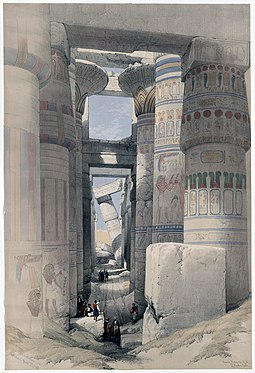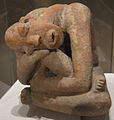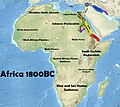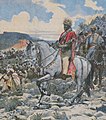Portal:Africa



Africa is the world's second largest and second-most populous continent after Asia. At about 30.3 million km2 (11.7 million square miles) including adjacent islands, it covers 20% of Earth's land area and 6% of its total surface area. With 1.4 billion people0 as of 2021, it accounts for about 18% of the world's human population. Africa's population is the youngest amongst all the continents; the median age in 2012 was 19.7, when the worldwide median age was 30.4. Despite a wide range of natural resources, Africa is the least wealthy continent per capita and second-least wealthy by total wealth, ahead of Oceania. Scholars have attributed this to different factors including geography, climate, lack of democracy, tribalism, corruption, colonialism, the Cold War, and neocolonialism. Despite this low concentration of wealth, recent economic expansion and the large and young population make Africa an important economic market in the broader global context.
Africa straddles the equator and the prime meridian. It is the only continent to stretch from the northern temperate to the southern temperate zones. The majority of the continent and its countries are in the Northern Hemisphere, with a substantial portion and a number of countries in the Southern Hemisphere. Most of the continent lies in the tropics, except for a large part of Western Sahara, Algeria, Libya and Egypt, the northern tip of Mauritania, and the entire territories of Morocco, Ceuta, Melilla, and Tunisia which in turn are located above the tropic of Cancer, in the northern temperate zone. In the other extreme of the continent, southern Namibia, southern Botswana, great parts of South Africa, the entire territories of Lesotho and Eswatini and the southern tips of Mozambique and Madagascar are located below the tropic of Capricorn, in the southern temperate zone.
Africa is highly biodiverse; it is the continent with the largest number of megafauna species, as it was least affected by the extinction of the Pleistocene megafauna. However, Africa also is heavily affected by a wide range of environmental issues, including desertification, deforestation, water scarcity and pollution. These entrenched environmental concerns are expected to worsen as climate change impacts Africa. The UN Intergovernmental Panel on Climate Change has identified Africa as the continent most vulnerable to climate change.
The history of Africa is long, complex, and varied, and has often been under-appreciated by the global historical community. Africa, particularly Eastern Africa, is widely accepted as the place of origin of humans and the Hominidae clade (great apes). The earliest hominids and their ancestors have been dated to around 7 million years ago, including Sahelanthropus tchadensis, Australopithecus africanus, A. afarensis, Homo erectus, H. habilis and H. ergaster—the earliest Homo sapiens (modern human) remains, found in Ethiopia, South Africa, and Morocco, date to circa 233,000, 259,000, and 300,000 years ago, respectively, and Homo sapiens is believed to have originated in Africa around 350,000–260,000 years ago. Africa is also considered by anthropologists to be the most genetically diverse continent as a result of being the longest inhabited. (Full article...)
Selected article –

Alodia, also known as Alwa (Greek: Aρουα, Aroua; Arabic: علوة, ʿAlwa), was a medieval kingdom in what is now central and southern Sudan. Its capital was the city of Soba, located near modern-day Khartoum at the confluence of the Blue and White Nile rivers.
Founded sometime after the ancient Kingdom of Kush fell, around 350 AD, Alodia is first mentioned in historical records in 569. It was the last of the three Nubian kingdoms to convert to Christianity in 580, following Nobadia and Makuria. It possibly reached its peak during the 9th–12th centuries when records show that it exceeded its northern neighbor, Makuria, with which it maintained close dynastic ties, in size, military power and economic prosperity. Being a large, multicultural state, Alodia was administered by a powerful king and provincial governors appointed by him. The capital Soba, described as a town of "extensive dwellings and churches full of gold and gardens", prospered as a trading hub. Goods arrived from Makuria, the Middle East, western Africa, India and even China. Literacy in both Nubian and Greek flourished. (Full article...)Featured pictures –
Did you know (auto-generated) -

- ... that Mackay Davashe wrote "Lakutshona Ilanga", the English version of which, sung by Miriam Makeba, became the first South African piece to chart on the Billboard Hot 100?
- ... that in 2022, Four Hundred Souls: A Community History of African America was a finalist for both an Andrew Carnegie Medal for Excellence in Nonfiction and an Audie Award for Multi-voiced Performance?
- ... that 555 Edgecombe Avenue, once named for a British soldier and occupied entirely by white Americans, later attracted notable African Americans like Paul Robeson and Count Basie?
- ... that Kobe and Vanessa Bryant were founding donors of the National Museum of African American History and Culture?
- ... that South African anti-apartheid activist Ebrahim Ismail Ebrahim confused warders at the Robben Island maximum security prison by playing Bollywood music?
- ... that in 1888, Edward P. Duplex became the first African American to be elected a mayor in California?
Categories
Selected biography –
Jean-Baptiste Philippe Ouédraogo (French pronunciation: [ʒɑ̃ batist filip wedʁaɔɡo]; born 30 June 1942), also referred to by his initials JBO, is a Burkinabé physician and retired military officer who served as President of Upper Volta (now Burkina Faso) from 8 November 1982 to 4 August 1983. He has since mediated a few national political disputes and operates a clinic in Somgandé.
Ouédraogo received his early education in Upper Volta before joining the Upper Voltan Army and studying medicine abroad. After working in healthcare, he was appointed chief medical officer of the Ouagadougou military camp. He participated in the November 1982 coup d'état and shortly thereafter assumed the presidency. More ideologically moderate than most of his comrades, Ouédraogo did not command much popular support and governed the country amid an unstable political climate. A protracted dispute with Prime Minister Thomas Sankara resulted in his removal from power in a coup in August 1983 and imprisonment. He was released in 1985 and resumed medical work. He opened a clinic in Somgandé in 1992, which he still operates. In the 2010s, he acted as a mediator between opposing political factions. (Full article...)Selected country –
 |
 |
|

| ||
Angola, formally the Republic of Angola (Portuguese: República de Angola, pronounced [ʁɛˈpublikɐ dɨ ɐ̃ˈɡɔlɐ], Kongo: Repubilika ya Ngola), is a country in south-central Africa bordering Namibia to the south, the Democratic Republic of the Congo to the north, Zambia to the east, and the Atlantic Ocean to the west. The exclave province Cabinda also borders the Republic of the Congo to the north. At 481,321 mi² (1,246,700 km²), it is the world's twenty-third largest country.
A former Portuguese colony, it has considerable natural resources, among which oil and diamonds are the most significant. Angola's economy has undergone a period of transformation in recent years, moving from the disarray caused by the Angolan Civil War to being the fastest growing economy in Africa and one of the fastest in the world. Growth is almost entirely driven by rising oil production which surpassed 1.4 million barrels per day in late-2005 and which is expected to grow to 2 million barrels per day by 2007. (Read more...)
Selected city –

Lusaka (/luːˈsɑːkə/; loo-SAH-kə) is the capital and largest city of Zambia. It is one of the fastest-developing cities in southern Africa. Lusaka is in the southern part of the central plateau at an elevation of about 1,279 metres (4,196 ft). , the city's population was about 3.3 million, while the urban population is estimated at 2.5 million in 2018. Lusaka is the centre of both commerce and government in Zambia and connects to the country's four main highways heading north, south, east, and west. English is the official language of the city administration, while Bemba, Tonga, Lenje, Soli, Lozi, and Nyanja are the commonly spoken street languages.
The earliest evidence of settlement in the area dates to the 6th century AD, with the first known settlement in the 11th century. It was then home to the Lenje and Soli peoples from the 17th or 18th century. The founding of the modern city occurred in 1905 when it lay in the British protectorate of Northern Rhodesia, which was controlled by the British South African Company (BSAC). The BSAC built a railway linking their mines in the Copperbelt to Cape Town and Lusaka was designated as a water stop on that line, named after a local Lenje chief called Lusaaka. White Afrikaner farmers then settled in the area and expanded Lusaka into a regional trading centre, taking over its administration. In 1929, five years after taking over control of Northern Rhodesia from the BSAC, the British colonial administration decided to move its capital from Livingstone to a more central location, and Lusaka was chosen. Town planners including Stanley Adshead worked on the project, and the city was built out over the subsequent decades. (Full article...)In the news
- 12 February 2024 –
- Two boats collide on the Congo River near Kinshasa, Democratic Republic of the Congo; with the death toll remains unclear. (AP)
- 11 February 2024 – 2023 Africa Cup of Nations
- In association football, hosts Ivory Coast win their third Africa Cup of Nations by defeating Nigeria 2–1 in the final. Sébastien Haller scores the winning goal in the 81st minute. (The Guardian)
- 10 February 2024 – Somali civil war
- Four Emirati soldiers and a Bahraini military officer are killed, while ten other people are injured, when a soldier opens fire at a military base in Mogadishu, Somalia, before being killed in the ensuing shootout. Al-Shabaab claims responsibility. (AP)
- 10 February 2024 –
- A Eurocopter EC130 helicopter crashes near Nipton, California, United States, killing all the six people on board, including Nigerian banker Herbert Wigwe. (CBS News)
- 10 February 2024 – 2023–2024 Senegalese protests
- Violent protests occur in Senegal following an announcement by President Macky Sall that presidential elections have been delayed from February 25 to December 15. (Sky News)
- 9 February 2024 –
- At least 18 people are killed during a collision between a bus and a truck on a road in Kinshasa, Democratic Republic of the Congo. (AP)
Updated: 16:33, 14 February 2024
General images -
Africa topics
More did you know –
- ...that Rukwanzi Island, an island in Lake Albert, one of the African Great Lakes, is the subject of a territorial dispute between the Democratic Republic of the Congo and Uganda?
- ...that Oumarou Sidikou, vice-governor of the Central Bank of West African States from 1988 to 1993, was a minister in the government of Nigerien Prime Minister Hama Amadou, which was ousted by a military coup in 1996?
- ...that Jason Dunford, an All-Africa Games gold medalist and runner-up for the 2006 Kenyan Sportsman of the Year award, has a younger brother who was selected "most promising sportsman" at the same awards?
- ...that Sam Mbakwe, governor of Imo State from 1979 to 1983, served in the army of the Republic of Biafra, an Igbo secessionist state in southeastern Nigeria, during the Nigerian Civil War?
Related portals
Major Religions in Africa
North Africa
West Africa
Central Africa
East Africa
Southern Africa
Associated Wikimedia
The following Wikimedia Foundation sister projects provide more on this subject:
-
Commons
Free media repository -
Wikibooks
Free textbooks and manuals -
Wikidata
Free knowledge base -
Wikinews
Free-content news -
Wikiquote
Collection of quotations -
Wikisource
Free-content library -
Wikispecies
Directory of species -
Wikiversity
Free learning tools -
Wikivoyage
Free travel guide -
Wiktionary
Dictionary and thesaurus

















































































